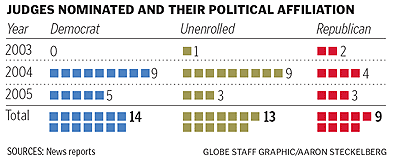. . .folks? With Thompson on the verge of dropping out, and Duncan Hunter already having tossed in the towel, we're realistically left with the choices of Mitt Romney, Rudy Giuliani, Mike Huckabee, and John McCain. (I intentionally omitted Ron Paul in an effort to taunt his supporters. Reading their posts is like watching a bunch of chimps play with a gas can. I wish some of his supporters would read me.) Most analysts seem to believe that the choice ultimately boils down to John McCain and Mitt Romney. With that in mind, I bring you:
MITT ROMNEYPut forth as the the guy to turn to in tough economic times, which seem to be
headed our way according to the trends. Yet, for all his supposed wizardry, Romney seems to have
struggled to create jobs even in the good times during his tenure as the governor of Massachusetts. Though he boasts of eliminating a budget deficit while he was there, it turns out that much of that projected deficit
never materialized due to big receipts in the form of capital gains taxes -- about $1.6 billion of the projected $3 billion shortfall. That lowered the bar considerably, and when you throw in the fact that he raised approximately $500 million by increasing fees -- which are just a way of making confiscatory taxes sound more voluntary -- you end up with over half the projected financial calamity eliminated through sheer serendipity and increased burdens placed on businesses in Massachusetts.
Social conservatives shouldn't be too comforted by the prospect of a Romney presidency, either. While he talks a good game nowadays, the fact of the matter is that he has developed a brand-spanking-new set of positions since he decided to seek the nomination. For example, his pro-life stance was conveniently formed sometime between the time he was
running for governor of Massachusetts, and today. Back then, he vowed to protect the pro-choice laws of the state, and do nothing to change them. However, the road to the White House apparently runs through Damascus. Romney certainly has experienced a conversion of the type that suggests so. One can accept his change of heart as sincere, but when a politician's positions undergo a whipsaw of such intensity, it's not out-of-bounds for someone to question that sincerity. In fact, I would submit that pro-life conservatives have a duty to question any candidate who undergoes such a transformation, just as they would question a potential Supreme Court nominee.
On another matter dear to conservatives, the Second Amendment, Romney has the same problem. When faced with an electorate not sympathetic to the idea that the people have the right to keep and bear arms, he
made the same kind of pledge he made with regard to the pro-choice laws of Massachusetts. But, beyond that, he continues to hold positions that are counter to those of many Second Amendment advocates within the GOP, supporting bans on weapons of "
extraordinary lethality." To many pro-gun conservatives, the term "extraordinary lethality" means "very effective". One might argue that perhaps Romney was referring to actual machine guns, or fully-automatic weapons, but that would be a moot point given the fact that it is already illegal to own any weapon of that type unless one holds a federal firearms license.
Romney also has to contend with his own statements with regard to this crucial issue. Feeling the need to bolster his credentials among conservatives who place a high priority on Second Amendment rights, and there are many, Romney stated that has been a
lifelong hunter. Not only was this a silly white lie (Romney had hunted exactly twice in his life.), but it missed the point of the Second Amendment entirely, which has nothing to do with hunting, and everything to do with one's ability to protect his own life, liberty and property. The fact that he would make such a statement is a legitimate reason to question his veracity on other issues. To ask conservatives to accept him at his word on this and other important issues after such a brazenly disingenuous attempt to ingratiate himself to a core constituency seems a bit much.
As if that weren't enough, there is the matter of his attempt to claim an endorsement from the most prominent advocacy group for gun owners when
none had been given. In fact, his Democratic opponent in the race in question had received a higher rating from the NRA than Romney had, but the NRA declined to endorse either candidate. Coupled with his boast on being a lifelong hunter, conservatives who hold the Second Amendment in high regard should be troubled by any statement he makes with regard to their rights as citizens to keep and bear arms. There's every reason to wonder whether or not, somewhere down the road, he would cast them aside in the name of political expediency.
In line with the other questions about Romney's veracity is the claim that he and his acolytes make to his being the heir to the Reagan legacy. Romney isn't the only person in the race who likes to put himself forth as a natural extension of the Reagan Revolution. All the candidates have stated similar beliefs at some point during the campaign. But, how many others have
rebuked any connection to Reagan, as Romney did in his unsuccessful attempt to unseat Ted Kennedy? How many sought to put distance between themselves and the man universally held as the standard by which all others should be measured among Republicans? How many claimed to be an "independent" with no desire to "return to Reagan-Bush"?
Mitt Romney might make a fine president should he somehow achieve the nomination in spite of all of these questions. But, given all of these facts, it seems well nigh impossible to imagine that any true conservative could prefer him over Sen. John McCain as the man to lead Republicans in 2008.












